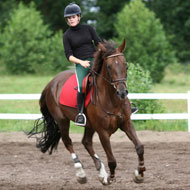
Slows a horses reaction speed by over a third
Magnesium can have a calming effect on horses, according to new research.
The study, conducted by the WALTHAM Equine Studies Group and Australian collaborators, shows that magnesium can significantly slow reaction speed responses in horses.
Researchers from the Charles Sturt University in New South Wales, Australia, investigated the effects of magnesium aspartate supplementation on the reaction speeds of six Standardbred geldings.
When 10g of magnesium was added to a roughage diet (clover/ryegrass/hay), which already provided the recommended daily intake of magnesium, the horses average reaction speed slowed down by over a third.
Without the supplement, the mean response time was 5.3 meters per second. With the supplement this reduced to 3.1 meters per second.
Clare Barfoot, research and development manager at MARS Horsecare UK, said: "Although the benefits of magnesium have been well documented anecdotally, this study provides the first scientific evidence that magnesium aspartate, which is found in some behaviour supplements such as our own T.E.N. Positive Calm Behaviour Plus, may influence behaviour.”
The findings will be presented at the Equine Science Society in Florida later this month.



 The latest
The latest